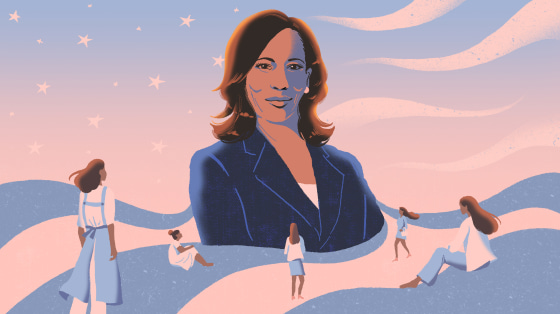After Joe Biden was projected to have won the presidency Saturday morning, Kamala Harris is set to become the next vice president of the U.S., making her the first Asian American, the first Black person and the first woman to hold the office. For many South Asians across the country, it's a historic win that has the potential to open doors for others like them.
Harris' political journey — she was the first person of Indian origin elected attorney general of California and to the Senate —will have an important impact on all women, particularly South Asian women, said Vanita Gupta, president of the Leadership Conference on Civil and Human Rights, who was head of the Justice Department's Civil Rights Division in the Obama administration.
"It is also an important beginning for my young sons and for children of color across our country, who have a role model in her and are watching the doors of America open wider for them," said Gupta, whose parents immigrated from the Indian state of Uttar Pradesh.
In addition to Harris, Rep. Pramila Jayapal, D-Wash., and Nikki Haley, the Republican former governor of South Carolina and former U.S. ambassador to the United Nations, have also risen to political prominence in recent years.
These examples defy the common stereotype that South Asian women are often expected to pursue more traditional career paths over politics and aren't assertive enough to hold leadership roles.
Seema Hari, 33, a model, activist and influencer based in California, said Harris has already had an impact on the community in her state.
"You can see how it can be an inspiration for most young people who are South Asian who traditionally don't get told to join politics at all," she said. "Every time I post about politics, my dad has to warn me to be careful. He's always like: 'Don't get political. Don't talk about politics on a public stage. Politics is not for you.' We're kind of trained to become only doctors and engineers and build wealth."
For her, Biden and Harris' victory is a much-needed first step that can inspire young South Asians to be more involved in politics and activism.
But Harris' identity doesn't mean her record won't be scrutinized. Hari said she hopes Harris' win will push others to confront the impact of her tough-on-crime record during her tenures as district attorney of San Francisco and attorney general of California.
"We've had such a big discussion around abolishing the police and defunding the police, and she comes from that background," Hari said. "She's directly responsible for a lot of the laws that incarcerated a lot of people here in California. I hope that all these discussions and people being inspired right now, they can push her to change her politics."
Dr. Hiral Tipirneni, an Indian American emergency medicine physician who was a congressional candidate in Arizona, said she hopes Harris' ascendance puts a spotlight not only on South Asian women's ethnic identities, but also on the issues they support. Tipirneni focused her own campaign on expanding affordable health care. She ran a close race against Republican Rep. David Schweikert, who was declared the winner.
"I think that diversity not just of background but also education, life experiences and opinions can help form robust policies," she said.
Tipirneni, 53, said one reason South Asians have been venturing into politics more is the realization that politicians should look more like the people they represent.
From 2010 to 2017, the number of South Asians living in the U.S. increased from 3.5 million to 5.4 million, according to a report by the nonprofit South Asian Americans Leading Together.
"When I was a kid growing up or in high school or college, if someone had said that a couple of decades from now an Indian American woman would hold the second-highest position in the country, I wouldn't have believed that as a possibility," said Tipirneni, who was born in Mumbai and moved to the U.S. at age 3.
Tipirneni said the gender roles often set for Indian women and the lack of diversity in government made her question whether to enter politics — so South Asian women will now benefit from seeing a brown face at such a high level.
Hari agreed. "The biggest thing for South Asians is young people realizing you can be this," she said.
At the same time, Hari said she hopes people stay focused on policy over identity politics, saying much of the discussions surrounding Harris' ethnicity have been rife with tokenization and oversimplification, even on the part of young South Asians who seek to "claim" her.
"I see that in the meme culture of the youth. People are portraying her as an 'auntie,' which is what we call South Asian women who are older," she said. "It doesn't sit with me really well. She's a woman, and she's intelligent, and she's capable."
Harris' win also helps combat Donald Trump's misogyny and racism, said the creators of the Twitter account Desis for Kamala — Smitha Haridas, Mini Kunhiraman, Nikhil Govindraj and Jyothish Rajan.
They reached out to young South Asians in the months leading up to the election and encouraged them to vote Trump out.
"His conspiracy theories, anti-immigrant, anti-Muslim rhetoric made us and our friends unsafe," they said in a statement.
Because Harris is a woman of color who helped take down Trump, they said her win was "poetic justice."

